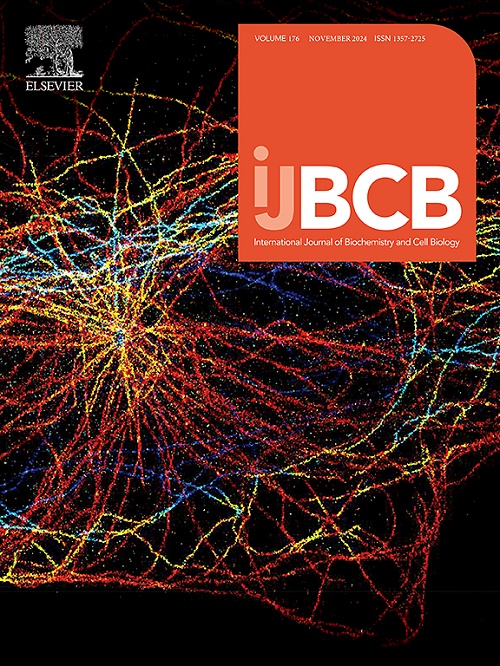Silencing HMGB1 secretion inhibited EV71-induced blood-brain barrier dysfunction and neural inflammation by depressing astrocyte activation via sHh signal blockage
IF 2.8
3区 生物学
Q2 BIOCHEMISTRY & MOLECULAR BIOLOGY
International Journal of Biochemistry & Cell Biology
Pub Date : 2025-05-10
DOI:10.1016/j.biocel.2025.106797
引用次数: 0
Abstract
It is unclear whether high mobility group protein B1 (HMGB1) is associated with the malignant characterization of hand, foot, and mouth disease (HFMD), and whether it plays a key regulatory role in the process of enterovirus 71 (EV71)-induced brain damage. Firstly, we analyzed the correlation between clinical information and HMGB1 concentrations in patients with mild and severe HFMD. Immunofluorescence was used to determine the expression level of HMGB1 in astrocytes. The levels of cellular inflammatory factors (IL-1β, IL-4, IL-6, TNF-α and TGF-β1), chemokines (CCL2, CXCL10 and CXCL12) and adhesion factors (integrin β, P-gp, VCAM-1 and ICAM-1) were detected by ELISA kits. Western blot was used to measure the levels of blood-brain barrier (BBB) stability related factors (retinoic acid (RA), ANG1, ApoE and IGF-1) in astrocytes and BBB structure related proteins (occluding, claudin, PTCH-1 and ZO-1) in endothelial cells. Clinical studies found that the expression of HMGB1 was closely related to the HFMD severity. Knockdown of HMGB1 alleviated EV71-induced neuron damage and inhibited cellular inflammation and apoptosis. Importantly, silencing HMGB1 depressed excessive proliferation and the inflammation response of astrocytes caused by EV71 infection. Furthermore, knockdown of HMGB1 enhanced BBB stability by improving astrocyte adhesion and endothelial tight junctions. Mechanistically, HMGB1 regulated the stability of BBB by regulating sHh signaling and secretion in astrocytes. In conclusion, the level of HMGB1 is closely related to the clinical symptoms of patients with HFMD, and inhibiting the expression of HMGB1 promotes BBB stability by promoting sHh signaling in astrocytes.
沉默HMGB1分泌可通过sHh信号阻断抑制星形胶质细胞激活,从而抑制ev71诱导的血脑屏障功能障碍和神经炎症。
目前尚不清楚高迁移率组蛋白B1 (HMGB1)是否与手足口病(HFMD)的恶性特征相关,以及它是否在肠病毒71 (EV71)诱导的脑损伤过程中发挥关键调节作用。首先分析轻、重度手足口病患者临床信息与HMGB1浓度的相关性。采用免疫荧光法检测HMGB1在星形胶质细胞中的表达水平。采用ELISA试剂盒检测各组细胞炎症因子(IL-1β、IL-4、IL-6、TNF-α、TGF-β1)、趋化因子(CCL2、CXCL10、CXCL12)和粘附因子(整合素β、P-gp、VCAM-1、ICAM-1)水平。Western blot检测星形胶质细胞血脑屏障(BBB)稳定性相关因子(维甲酸(retinoic acid, RA)、ANG1、ApoE、IGF-1)和内皮细胞血脑屏障结构相关蛋白(occlocclin、claudin、PTCH-1、ZO-1)水平。临床研究发现HMGB1的表达与手足口病的严重程度密切相关。HMGB1表达下调可减轻ev71诱导的神经元损伤,抑制细胞炎症和凋亡。重要的是,沉默HMGB1可抑制EV71感染引起的星形胶质细胞过度增殖和炎症反应。此外,HMGB1的敲低通过改善星形胶质细胞粘附和内皮紧密连接增强血脑屏障的稳定性。HMGB1通过调节星形胶质细胞的sHh信号和分泌来调节血脑屏障的稳定性。综上所述,HMGB1水平与手足口病患者的临床症状密切相关,抑制HMGB1表达通过促进星形胶质细胞sHh信号传导促进血脑屏障稳定性。
本文章由计算机程序翻译,如有差异,请以英文原文为准。
求助全文
约1分钟内获得全文
求助全文
来源期刊
CiteScore
8.10
自引率
0.00%
发文量
124
审稿时长
19 days
期刊介绍:
IJBCB publishes original research articles, invited reviews and in-focus articles in all areas of cell and molecular biology and biomedical research.
Topics of interest include, but are not limited to:
-Mechanistic studies of cells, cell organelles, sub-cellular molecular pathways and metabolism
-Novel insights into disease pathogenesis
-Nanotechnology with implication to biological and medical processes
-Genomics and bioinformatics

 求助内容:
求助内容: 应助结果提醒方式:
应助结果提醒方式:


